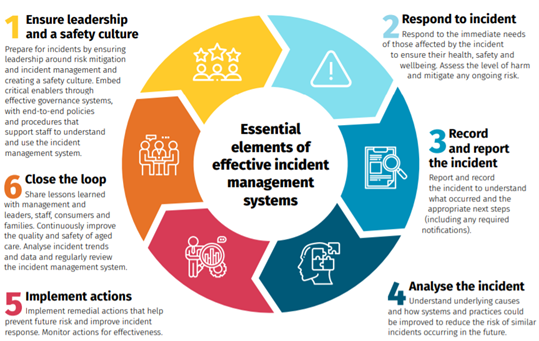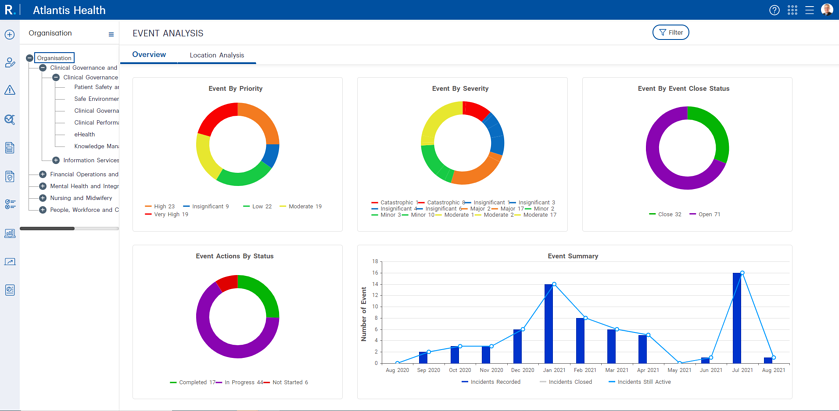In recent decades Aged Care in Australia has become a large and complex system, with significant challenges at every level, including delivery, management or governance. The quality and safety of care varies widely across the sector, with confronting stories of neglect, abuse and sub-standard services being widely reported in the media. This together with a series of inquiries led to the establishment of a Royal Commission into Aged Care Quality and Safety in October 2018.
A key finding of the Royal Commission, tabled in its Final Report in March 2021, was that the existing compulsory reporting scheme in Aged Care was unsatisfactory. It had a limited scope of incidents that had to be reported and the information reported by approved providers was not being used effectively.
“Any serious incident response scheme must have the capability to detect patterns in reports that indicate an ongoing risk to the safety of people receiving aged care services.”
This principal of detection, reporting and linking to risks and their underlying root causes, can of course be applied to the full range of incidents that occur in Aged Care, be it residential or home care services. It both meets the needs of regulators and most importantly underpins improved consistency and quality of aged care for those receiving it.
Legislative Framework
Commonwealth funded providers of residential Aged Care and flexible care in residential settings operate within an Aged Care legislative framework that supports the provision of quality care and services within a safe environment.
A key requirement of the framework is the prevention and effective management of risks and incidents. The associated requirement for an incident management system is integrated with other regulatory settings including the Charter of Aged Care Rights, the Aged Care Quality Standards, open disclosure requirements, clinical governance requirements, and the Serious Incident Response Scheme.
Aged Care Quality Standards
Commonwealth funded aged care service providers are required to provide evidence of their compliance with and performance against the eight Aged Care Quality Standards.
Requirement (3)(d)(iv) under Quality Standard 8, Organisational governance, specifies that organisations must have a risk management system and processes to identify and assess risks to the health, safety and well-being of consumers. The risk management system together with an incident management system should also ensure incidents and ‘near misses’ are identified and evaluated (clinical incidents and those involved with delivering care and services). There is also an expectation that the organisation will use this information to improve its performance and delivery of quality care and services.
Specifically, it states:
(iv) Managing and preventing incidents, including the use of an incident management system Organisations are expected to effectively prevent and manage incidents, including through the use of an incident management system that enables incidents to be identified, responded to, and notified to the Commission (as required). Incidents should be resolved in consultation with consumers and staff, and incident data should be used to identify trends, drive continuous improvement to improve the quality of the care and services, and prevent similar incidents from occurring.
Serious Incident Reporting Scheme
The Serious Incident Reporting Scheme establishes responsibilities for approved providers of residential Aged Care and flexible care delivered in a residential Aged Care setting to prevent and manage incidents (focusing on the safety and wellbeing of consumers), to use incident data to drive quality improvement and to report serious incidents to the Commission.
SIRS has 2 stages:
- From 1 April 2021 providers are required to have in place an effective incident management system and report to the Commission all reportable incidents assessed as Priority 1 reportable incidents
- From 1 October 2021 providers are required to report all reportable incidents whether they are assessed as Priority 1 or Priority 2 reportable incidents
Notifications of reportable incidents must be lodged electronically using the form available through the My Aged Care service provider portal.
The SIRS aligns with other regulation including the integrated expectations of the Charter of Aged Care Rights, the Aged Care Quality Standards and open disclosure requirements.
Effective Incident Management Systems
In March 2021, the Australian Government’s Aged Care Quality and Safety Commission released a guide for Commonwealth funded providers, Effective Incident Management Systems: Best practice guidance.
This resource, aligned to the Quality Standard 8 (3)(d)(iv) and the Serious Incident Response Scheme, provides guidance for providers on the identification, management and reporting of incidents and associated risks within the Aged Care sector.
The following key elements are identified for an effective incident management system:

Source: Aged Care Quality and Safety Commission, 2021
Integrated Risk and Incident Management in Aged Care
The new Aged Care legislation and associated guidelines make it clear that Aged Care providers must establish effective risk and incident management systems and processes that comply with Australian Government requirements. These systems and processes must be integrated in practice to ensure that a clear linkage can be made between a risk event and associated incidents and the controls that are put in place as the preventative front-line.
While these recent Aged Care legislative reforms will drive improvements and integration of risk and incident systems and processes, they are for a number of organisations ahead of the capability and capacity to efficiently deliver on them. That is where Camms software can play a key role for your organisation in providing a fully integrated system for identification, assessment/investigation, actioning and reporting. Camms has a track record in Health and Aged Care of being able to deliver this in a timely and cost-effective way.
Camms integrated risk, incident and compliance modules can be delivered in a single cloud-based solution. Camms software aligns with relevant ISO Standards and has been deployed successfully in a number of Health and Aged Care service provider organisations in Australia and the United Kingdom.
Camms’ central point of oversight provides a comprehensive approach to governance, risk and compliance in an Aged Care setting:
- Clinical and Operational Risks – Camms.Risk module captures, assesses, monitors and reports on clinical and operational risks, key risk indicators, controls and treatment actions. It also enables linkage with incidents, audits, compliance obligations and other risks.
- Incidents, Hazards and Near Misses – Camms.Risk Incident Management module captures all details of incidents, hazards and near misses, provides investigation workflows and action plans and provides linkage to respective risks and compliance obligations. Incidents, near misses and hazards can also be captured on mobile devices by staff in any location.
- Compliance Obligations – Camms.Risk Compliance module captures provides oversight and accountability for changes in regulations and internal policies.
- Board and Management Oversight – Camms integrated solutions provide summary analysis and tracking views for process managers, senior management and Boards of risk, incident and compliance status to support timely decision making and rapid response

Camms software is helping many Australian Aged Care organisations make the right decisions, manage risks, capture and investigate incidents, align talent, and focus on what matters, click here to request a demo.





